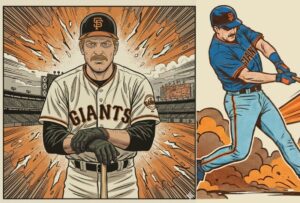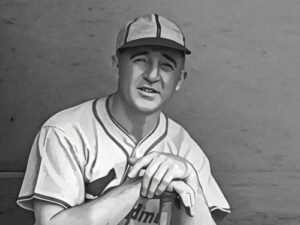The career of Derek Jeter is a perfect illustration of the multitude of factors that go into a Hall of Fame discussion. And rightly so.
The contemporary Nomar Garciaparra seemed to be better than or on par with Jeter in their 20s. Alex Rodriguez had a vastly superior career as a shortstop. Yet, Jeter will breeze into the Hall of Fame, possibly challenging the record for voting percentage, while Garciaparra will probably never earn election and ARod’s status is uncertain.
Jeter was born 11 months after Nomar, but he was a starting shortstop in the major leagues a year before Garciaparra.
Tens of thousands of words have been written about Jeter’s defense, and I won’t delve deep into it here. Simply stated: Jeter cost his team more runs in the field than any other player in history. That’s a function of two things: (1) he played an important defensive position longer than anyone ever has, and (2) his range was subpar. Had he not been wearing the most famous pinstripes in sports, Jeter would have been shifted to the outfield mid-career. But someone had to be the Babe Ruth of the Left Side of the Infield, and #2 was the man.
Try telling that brutal truth to Yankee fans who worship the shortstop, and you’ll be greeted with a loud Bronx cheer. In the eyes of Yankee fans, Jeter is the greatest shortstop since Honus Wagner was running his bowlegs around the bags. But where does Jeter rate among shortstops all-time in baseball history?
The best shortstop since his own teammate
Elsewhere on BaseballEgg I’ve ranked the Top 100 Players in baseball history at every position. Jeter comes in at seventh on that list, just above Ozzie Smith and Ernie Banks, two shortstops known for very different skill sets. The players immediately ahead of Jeter on our greatest shortstops list are Robin Yount, Arky Vaughan, Pee Wee Reese, Honus Wagner, Cal Ripken Jr., and #1 on the list, Alex Rodriguez. Five of those players are in the Hall of Fame, with the exception of ARod.
Which means that for ten years the Yankees chose to play Jeter at shortstop instead of the greatest shortstop in history, electing to move Rodriguez to third base. One can see why Yankee brass may have seen this as a wise decision, for PR purposes and for the health of the clubhouse, but it was most definitely not a good decision based on talent.
ARod was a better hitter, better defender, and better baserunner (in his prime) than Jeter. Which shouldn’t come as a surprise to anyone who watched them play. Jeter wins in the intangibles: leadership, “clutchness” (if that last one even exists).
Who was better: Jeter or Nomar?
In our all-time rankings of shortstops, Nomar Garciappara ranks 19th. Does that sound right? Well, consider that Nomar had his last great season at the age of 29. After that he was traded by the Red Sox to the Cubs, where he never got comfortable and was rarely healthy, before moving on to Los Angeles. He spent three seasons in his hometown playing first base for the Dodgers but only occasionally looking like the younger Nomar at the plate. One final injury-marred season followed with the A’s where he eventually had to accept the undignified role of pinch-hitter and part-time designated hitter. He swung the bat for the final time at the age of 36 in 2009. Poof! He was done.
Once a sure-fire Hall of Fame shortstop, Nomar ended up with fewer than 2,000 hits and fewer than 1,000 runs scored. No position player who played after 1959 has been elected with fewer than 2,000 hits, and only one (Bill Mazeroski) has been elected after scoring fewer than 1,000 runs. Even though Nomar had won the Rookie of the Year Award and been an MVP runner-up by the age of 24, he failed to maintain his production into his 30s.
But up to age 30, Nomar was a better shortstop than Jeter right?
No.
Even though Nomar was 11 months older than Jeter, the Yankee shortstop was a regular in the major leagues a year before his Red Sox counterpart. In 1996, Jeter won the Rookie of the Year Award after hitting .314 with 183 hits, 104 runs scored, and an 800 OPS. His WAR that season was a respectable 3.3, not bad for a debut season. In 1997. Garciappara led the league in hits and triples, hit 30 homers, drove in 98, and stole 22 bases. He was named Rookie of the Year, and his season was exactly twice as valuable as Jeter’s rookie year (6.6 WAR).
But over the next few seasons, while Nomar won a couple of batting titles, Jeter was playing great too. And because Jeter stayed in the lineup while Nomar missed 20-30 games per season, Jeter stayed with Nomar. After eight seasons for each, Nomar held a slight edge in WAR, 42-41. Then the Red Sox shortstop fell off that cliff. Jeter kept rolling, and even though he was a bad defensive shortstop, his bat provided lots of value, even coming through with a brilliant season at the age of 35 and a fine revival season at the age of 38 when he became one of the few players in history to have a 200-hit season after he’d reached 3,000 hits.
Clearly, Nomar had a few more “high-profile” seasons in his 20s, winning batting titles and hitting more home runs. But Jeter played in a larger park and hit in the leadoff spot or second in the batting order most of his career, which is why his RBI count was lower than Nomar’s.
Outside of a year or two at their absolute peak, Nomar was never a better shortstop that Jeter. Their WAR7 (best seven seasons) are nearly identical: Nomar at 43.1 and Jeter at 42.3. Their three best seasons are also nearly the same (Jeter with an edge, 22.1 to 21.3). And of course, Jeter holds a huge career lead in every category, and leads in WAR 72-44.
Based on his nearly identical production at their peaks, and his dominance in career length and value, and his importance as a leader on pennant-winning teams, Derek Jeter was a better shortstop than Nomar Garciappara, by a pretty wide margin. But Nomar was still great enough from age 22 to age 30 to rate 19th all-time. Which isn’t shabby.
The Yount Comparison
When Robin Yount was 26 years old he won the American League Most Valuable Player Award. Two years later he played his last game as a shortstop. The Brewers moved him to the outfield in the spring of 1985, and a few years later in 1989 when he was 33, Yount won his second MVP award.
Why did Milwaukee switch Yount to the outfield? Three reasons: (1) twice in an 18-month period between 1983 and 1984, Yount went under the knife for shoulder surgery, which left his throwing arm weak; (2) the Brewers had a young shortstop named Ernest Riles whom they wanted to move into a starting role; and (3) the team had a gaping hole in center field and Yount was the best athlete on the team.
Yount did not really want to move from shortstop. “They had me set to play center field before camp opened, so I came here prepared to play center field,” Yount said. “I expect to be 100% by opening day and would like to think I could still play shortstop, but whether I will or not I don’t know. I mean, I haven’t completely given up on it.”
But Yount did move, and it worked out wonderfully. By 1987, his third season in the outfield, he was flourishing and producing like an outfielder at the plate, posting consecutive OPS+ of 125, 125, 132, and 152, culminating in his second MVP. His arm never recovered but it didn’t matter as much in center, and he was able to cover ground well out there for the Brewers. He played until he was 37 and like Jeter he topped 3,000 hits.
What if Jeter had moved to center in 2004 when ARod was traded to the Yankees? That would have split his career into two halves: his shortstop years and his outfield years. Jeter would have been replacing Bernie Williams in center: Bernie’s career was winding down at that time anyway. He would have been helping the team, though the Yanks would have had a hole at third. But Brian Cashman could have spent George Steinbrenner’s money to fill that very nicely, for sure.
But Jeter didn’t move. He wanted to the Yankees’s shortstop. Interestingly, from 2004 to the end of his career the team won only one pennant with Jeter at short and ARod at third. Would things have been different with ARod at short and Jeter in center? We’ll never know. A Yount Switch might have been a good choice for the Yanks.






